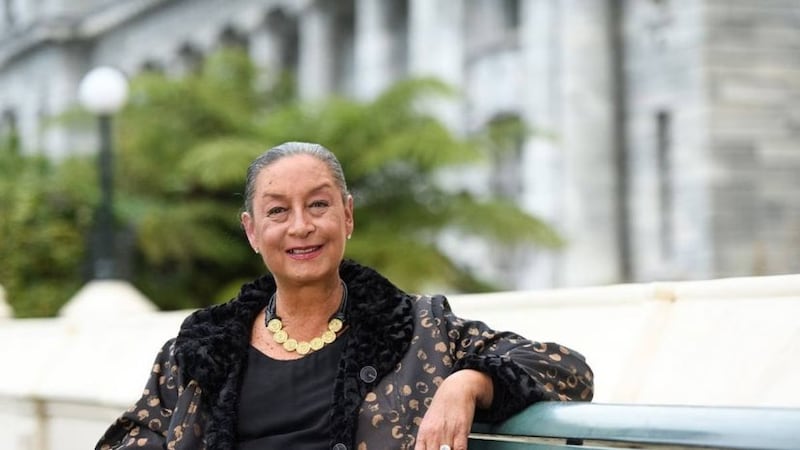Photo / NZME
The world's first openly transgender MP and mayor, Georgina Beyer has died, aged 65.
Beyer (Te Ati Awa, Ngāti Mutunga, Ngāti Raukawa and Ngāti Porou) died at Mary Potter Hospice in Wellington, after an extended battle with kidney disease.
Prime Minister Chris Hipkins has paid tribute to Beyer, saying she leaves a pioneering legacy.
“I certainly think that Georgina blazed a trail that has made it much easier for others to follow,” Hipkins said.
Born June 1, 1957, in small-town Wairarapa, Beyer set the stage for her political career as a television presenter and cabaret performer.
In 1995, she shook political orthodoxy by being elected the mayor of her conservative hometown of Carterton, making her the first openly transgender mayor in the world.
Māori Language Act
Beyer championed economic development and community engagement, during her time in the mayoralty.
In 1999, Beyer turned to National politics, successfully running for Labour in the historically-blue electorate seat of Wairarapa, thereby becoming the world's first openly transgender MP; she was re-elected in 2002.
During her time as an MP, Beyer advocated for LGBTQ+ rights, affordable housing and progressive labour policies, and equity and redress for Māori.
One of her key achievements was the passage of the Māori Language Act 2003, which established the Māori Language Commission and provided funding and support for the promotion and preservation of te reo Māori.
Beyer was a vocal advocate for the use of the Māori language in government and public life, and supported initiatives to increase the visibility and use of te reo in schools, universities, and other public institutions. She believed that te reo Māori was critical to Aotearoa New Zealand's identity and culture, and that it was essential to ensure it was preserved and protected for future generations.
LGBTQ+
Another of Beyer's key achievements was the passage of the Civil Union Act 2004, which granted legal recognition to same-sex relationships, providing many of the same rights and benefits as marriage.
In 2001, she supported the passage of the Human Rights Amendment Act, which added sexual orientation to the list of prohibited grounds for discrimination under New Zealand law.
Beyer used her own experiences as a transgender person to raise awareness and promote greater understanding of rights and issues, and worked to break down stereotypes and misconceptions about the LGBTQ+ community.
In 2008, after a 36-year-old Wairarapa man died following a brutal homophobic attack in Featherston Park, just south of Carterton, Beyer spearheaded engagement around addressing homophobia in the community.
Childhood, prostitution and sexual assault
Beyer identified as a woman at the age of five. She later said she joined the school choir and started acting so she could wear dresses. She says she got into prostitution because of a lack of job opportunities for trans women at the time.
Beyer went to the private Wellesley College in Lower Hutt, before going to public school in Papatoetoe in Auckland.
She eventually went back to Pōneke, New Zealand's transgender capital at the time.
“Because of my transitioning at that time and the lack of social compassion, it forced you to live in this ‘twilight world’. Among ‘people of the streets’, if you like, there was an odd bond because we were all enduring the same sort of social exclusion." she later said.
“I guess I got a bit more forceful and assured about who and what I am - and nothing was going to alter my path to achieve what I needed to achieve in becoming a woman.”
Beyer recounted a sexual assault on her by a group of men in 1979; that fuelled her ambition to get into office and change things, given she didn't feel she could go to police.
The Prostitution Reform Act she championed in 2003 decriminalised prostitution, which Beyer said would help to protect sex workers from exploitation and abuse, and allow them to access healthcare and other services without fear of legal repercussions.
Since the law change, New Zealand has been regarded as a global leader in prostitution law reform, and many other countries have looked to Aotearoa as a potential model for their own law reform efforts.
Winning Wairarapa, against the odds
Beyer was "never expected" to win the 1999 election for Labour in the Wairarapa, according to NZME.
She was up against TV and radio shock jock Paul Henry, who was running for National but she defied the odds in a region that had "always been a deep shade of blue".
“I had a name as a mayor and I suppose I ticked a lot of the identity politics boxes: Māori, transgender, woman.” she later said.
Following a life-saving kidney operation in 2017, Beyer was invited to speak at the prestigious Oxford and Cambridge University unions, and in 2020 was appointed to the New Zealand Order of Merit for services to LGBTIQA+ rights.
Beyer was "humbled, grateful, and delighted", adding there was no single victory she could point to and say, "That was it, that was the win."
Instead, she described a long, steady, and patient battle to gain widespread acceptance of the rainbow community.
Beyer will lie at Pipitea Marae in Pōneke tomorrow.
A public memorial service is expected to be held in coming weeks.


